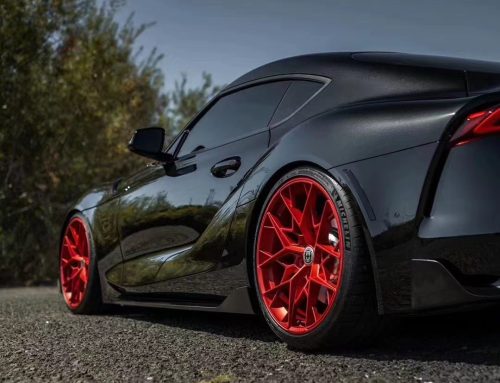As we all know, the main commonly used wheels on the market are divided into two types, one is forged wheels, and the other is cast wheels. How do you distinguish these two types of wheels?
1. Different processes. Cast wheels are made by casting molten aluminum in sand mold, cooling and molding, and then machining (deburring, trimming, polishing). The forged wheel is made of steel mould, in which the aluminum block softened by heating is placed, formed by stamping, and then machined after cooling.
2. For different combinations, forged wheels can be divided into two pieces and three pieces, which are generally combined by welding or willow nails. Cast wheels belong to one-time forming.
3. There are differences in gloss. The front and back of forged wheels are both smooth and bright, and both sides are smooth. But the metal luster of the front and back of the cast wheel is different, one side is bright and the other side is dark. Some cast wheels can also see obvious demoulding marks, even burrs. If the processing is worse, you can see small holes or sand holes on the back, as well as die stamping.
4. There are differences in weight. Because the aluminum block is continuously stamped during production, the molecular structure of forged wheels will become very tight after forming, so they can withstand higher pressure. Therefore, under the same size and strength, forged wheels are lighter than cast wheels.
5. Costs vary. The casting process is simple and easy to mass produce, so the cost is relatively low. The forged wheels are more expensive because of the complex process.
6. After knocking, the sound is different. When you knock the wheel with a small metal rod, the forged wheel can make a clear and pleasant sound, and the echo of the cast wheel is dull and deep.
To sum up, what are the advantages of forged wheels?
1. Durable and more secure
The forged wheel is 1-2 times stronger than the cast wheel, 4-5 times stronger than the ordinary iron wheel, so it is stronger and more crash resistant. The toughness and fatigue resistance are also significantly better than the cast wheel, which is not easy to crush and fracture, and has higher safety.
2. Lightweight and more fuel efficient
Compared with cast wheels, forged wheels of the same size can be about 20% lighter in weight, while 1KG lighter wheels can increase 10 horsepower. In addition, lightweight also makes
The reaction speed of the suspension system has also been significantly improved. The suspension system has a faster reaction speed, which makes it easier to deal with potholes on the road, and the sense of turbulence has been greatly reduced.

3. Good fuel economy and heat dissipation
According to the Japanese experiment, every 1kg reduction in the weight of a five seater car will save about 20L of gasoline a year. However, the research report published by the American Society of Automotive Engineers pointed out that although forged wheels are more expensive than ordinary cast wheels, in the long run, the cost will be recovered when the car reaches 130000 kilometers. In addition, forged wheels have better heat dissipation effect. When driving at long distance and high speed, they can prevent brake drum and tire from aging, increase service life and reduce the chance of tire blowout.
4. Better handling performance
The upgraded forged wheels increase the width of the wheels without affecting the steering and loading, so that the vehicle’s acceleration, braking and curve sensitivity will be significantly improved. No matter from static to starting, or accelerating during driving, the car will obviously feel lighter. The car will obviously feel light under the feet no matter when entering or exiting the curve.
5. More beautiful
Because the forged wheel has a compact structure and can withstand high stress, it can design some lively thin spokes in the modeling design, with high degree of freedom of design. It can design wheels suitable for the overall appearance of the customer’s car according to the owner’s needs, making the car more personalized.


